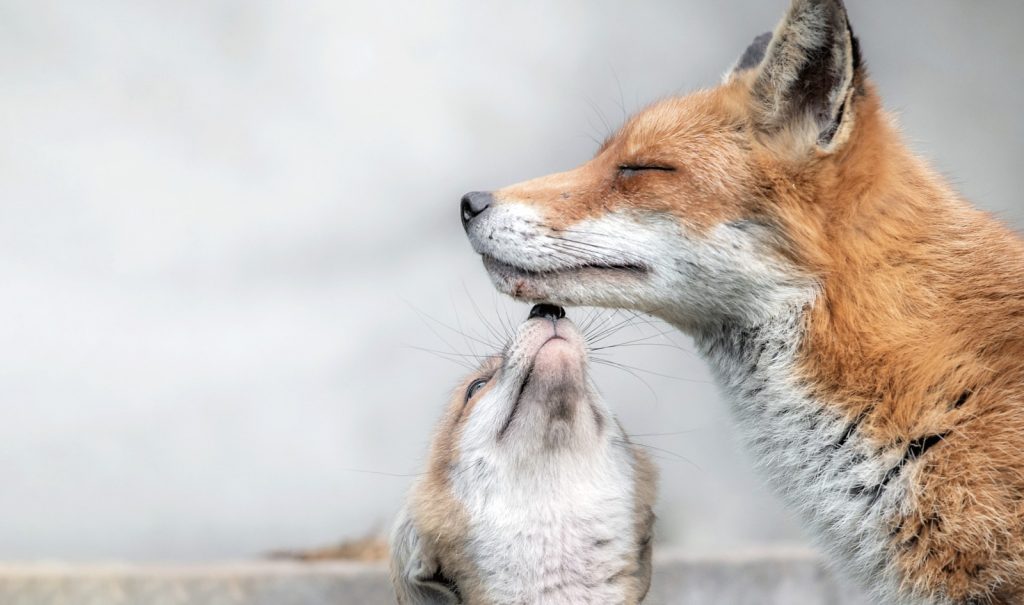For all those women and men whose mothers have died, for all the women who could not have children, and for all the children whose mothers didn’t want to have them, I second a columnist and mother who wrote:
“The world has enough suffering in it without inventing a holiday that causes so much pain, and I would gladly eradicate it from the calendar if I could.”
The tidal pull of sentimentality then overtakes her however, and she slides into schlock:
“Ambivalence about the holiday notwithstanding, I will gladly play every cute-animal video and click through every cute-animal slide show that crops up on the internet at this time of year. Who could resist the lioness purring as she licks her cub’s belly, or a fox carrying her kit to safety by the scruff of its neck?”

Well, I for one. It isn’t a matter of resistance to romanticism, but insistence on insight. Blurring the line between humans and other animals impedes humans from growing into human beings, and adds to man’s destruction of animals. Anthropomorphizing only makes us feel less separate in our separativeness.
The refusal to see the existential gulf between humans and the rest of the animal kingdom, to ignore the difference rather than understand the devastation our species has brought and continues to bring to the fellow creatures with whom we share this beautiful planet, amounts to willful ignorance.
The “ambivalence” above reveals an obscuring tendency in human nature, often found in women who have had to deal with male domination for countless generations. It has in recent years been adopted by both sexes in our confused society: A convenient and calculated ambiguity, motivated by the propensity to try to have things both ways.
There are still many places in the world where a woman risks physical violence by men for honestly saying what she really thinks. Perhaps over the generations it’s become ingrained in most cultures for women to maintain a tactical ambiguity.
The real and present danger now is of not seeing and saying things as they are. It outweighs, in the West at least, the habit of tactical ambiguity. Neither women nor men can have things both ways.
Indeed, now that one of America’s political parties has become the party of lies, telling the truth has become urgently necessary. It’s as if the Republicans are carrying out an experiment to see how far lies, fantasies and delusions can go.
On the other side of the social/political spectrum, there’s an unintended pathos in the sentiment that “it comforts me to be reminded of the universality of grief, to remember that we are not alone in our suffering, or in where we look for solace.” Not where humans are concerned, but in stories like that of an “orca carrying her dead calf for 17 days, across a thousand miles of ocean, because she could not bear to let the baby go.”
Though we can be sure that higher mammals, such as orcas and elephants, experience grief at the loss of an offspring or loved one, we really have no idea of what is going on in their minds. Suffering is the human condition, not the condition of animals in nature. The only thing we can be clear about is what is going on in our own minds, though apparently few people are.
When my mother died suddenly nearly ten years ago, I didn’t want to talk to anyone, but went to my meditation place and stayed for hours.

Mother and I were close, but saw things very differently and argued openly, mostly without rancor, since I was a teenager. She never forgave me for leaving the Catholic Church of my upbringing in parochial school and Mass six days a week, nor for leaving what I felt to be the socially claustrophobic state of Michigan.
By the end of her life she had lost her faith and become quite embittered, whereas I had grown in mystical experiencing. The gulf was too great, and I couldn’t convey anything to her of the true “communion” I felt.
But at my meditation place along the stream, after the mind quieted and the heart grew peaceful, I forgave her for her wrongness in not forgiving me for my rightness, and asked that she be forgiven and released.
I felt her presence, and an understanding from her I never knew in life. Was it imagined, or real? I won’t know until the hour of my death, but it stuck. And though I miss her, I understand her, as I never did in life.
Martin LeFevre

